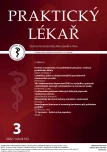-
Medical journals
- Career
Problematics of administration of risky medicinal products by the general nurse
Authors: M. Lebdušková 1; M. Krause 2,3
Authors‘ workplace: Technická univerzita v Liberci Fakulta zdravotnických studií Děkan: prof. MUDr. Karel Cvachovec, CSc., MBA 1; Jihočeská univerzita v Českých Budějovicích Zdravotně sociální fakulta Ústav ošetřovatelství, porodní asistence a neodkladné péče Ředitelka: prof. PhDr. Valérie Tóthová, Ph. D. 2; Vysoká škola zdravotnická, o. p. s., Praha 5 Rektorka: doc. PhDr. Jitka Němcová, PhD. 3
Published in: Prakt. Lék. 2022; 102(3): 140-144
Category: Of different specialties
Overview
Aim: The aim of the research investigation was to find out the knowledge of general nurses about the principles of administration of high-risk drugs, especially knowledge of the principles for administration of potassium chloride (KCl) solutions for injection with a concentration of 7.45%, insulins and heparins.
Method: The research was processed by a quantitative research method. The technique of the work was a questionnaire to be filled in only by general nurses. The research was carried out in standard departments of surgery and internal medicine in a regional hospital. Preliminary research and main research were realized in May 2021.
Results: The research was found positively that general nurses have knowledge about the principles of administering high-risk drugs. However, a critical areas were knowledge about for example, the manifestations of hypokalaemia, rate of administration of potassium solutions and the storage temperature of hazardous drugs.
Conclusion: Knowledge of general nurses about the principles of administration of medicinal products and especially risky medicinal products, are an important aspect in the prevention of medication mistake. The research investigation was found that knowledge of this needs to be deepened and provide regular training.
Keywords:
nursing – Heparin – insulin – general nurse – medication – hazardous drugs – potassium chloride
Sources
1. MZČR. Minimální požadavky pro zavedení interního systému hodnocení kvality a bezpečí poskytovaných zdravotních služeb. Věstník Ministerstva zdravotnictví České republiky 2015; částka 16, s. 4.
2. Sedlářová P, Wirthová V, Vytejčková R. Ošetřovatelské postupy v péči o nemocné III: Speciální část. Praha: Grada Publishing 2015.
3. Tóthová V, Bártlová S, a kol. Knowledge of nurses in relation to the treatment of medicinal products. Kontakt 2020; 22(4), 214–221.
4. Pokorná A, a kol. Management nežádoucích událostí ve zdravotnictví: metodika prevence, identifikace a analýza. Praha: Grada Publishing 2019.
5. MZČR. Národní ošetřovatelské postupy. Věstník Ministerstva zdravotnictví České republiky 2020; částka 5, s. 26–33.
6. SÚKL. Kaliumchlorid 7,45% Braun koncentrát pro infuzní roztok: souhrn údajů o přípravku. SÚKL 2018 [online]. Dostupný z: https://www.sukl.cz/modules/medication/detail. php?code=0107678&tab=texts [cit. 2022-04-29].
7. SÚKL. Humulin R 100 IU/ml injekční roztok: souhrn údajů o přípravku. Praha: SÚKL 2020 [online]. Dostupný z: https://www. sukl.cz/modules/medication/detail.php?code=0214355&tab= - texts [cit. 2022-04-29].
8. Zeleníková R, Jarošová D. Ošetřovatelství založené na důkazech: Evidence Based Nursing. Praha: Grada Publishing 2014.
9. Rychlíčková J, Kudělová J, Šlesingrová M, Gregorová J. Bezpečnost koncentrovaných roztoků kalia. Remedia 2015; 25(1): 43–45.
10. SÚKL. Heparin Léčiva 5000 IU/ml injekční roztok: souhrn údajů o přípravku. Praha: SÚKL, 2018 [online]. Dostupný z: https://www. sukl.cz/modules/medication/detail.php?code=0093746&tab= - texts [cit. 2022-04-29].
11. Krause M, Dolák F, Froňková M. The knowledge of nurses on the disinfection of reusable objects and surfaces in clinical practice. Kontakt 2021; 23(1): 8–13.
12. Bélová M, Krause M. Zásady podávání vybraných léčivých přípravků z pohledu znalostí studentů. Klinická farmakologie a farmacie 2022; 36(1): 8–12. doi: 10.36290/far.2022.002
13. Hejduková J, Krause M. Prevence medikačního pochybení z pohledu pacienta. Prakt. Lék. 2022; 102(1): 13–17.
Labels
General practitioner for children and adolescents General practitioner for adults
Article was published inGeneral Practitioner

2022 Issue 3-
All articles in this issue
- Patients with medically unexplained symptoms in general practice
- Giardiasis, one of the most important parasitic diseases in the world
- The influence of the implementation of ERAS recommendations on the results in patients in colorectal surgery: a retrospective and comparative study
- Problematics of administration of risky medicinal products by the general nurse
- Metastatic renal cell carcinoma: past and present
- Lung cancer and its screening from the perspective of a general practitioner
- 11. červenec – Světový den populace
- Prof. MUDr. Julius Špičák, CSc. – životní jubileum
- General Practitioner
- Journal archive
- Current issue
- Online only
- About the journal
Most read in this issue- Giardiasis, one of the most important parasitic diseases in the world
- Lung cancer and its screening from the perspective of a general practitioner
- Patients with medically unexplained symptoms in general practice
- Problematics of administration of risky medicinal products by the general nurse
Login#ADS_BOTTOM_SCRIPTS#Forgotten passwordEnter the email address that you registered with. We will send you instructions on how to set a new password.
- Career

